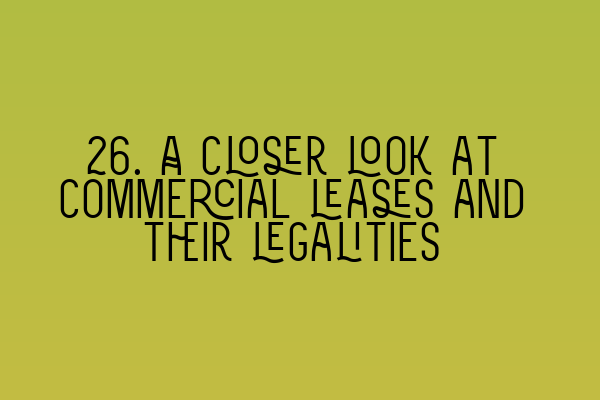A Closer Look at Commercial Leases and Their Legalities
Commercial leases play a crucial role in the world of business, providing a legally binding agreement between landlords and tenants for the rental of commercial property. Understanding the legalities surrounding commercial leases is vital for both parties involved to protect their rights and interests.
What is a Commercial Lease?
A commercial lease is a contract that outlines the terms and conditions under which a commercial property is rented out to a tenant. This type of lease is different from residential leases, as it pertains to properties used for business purposes such as retail stores, office spaces, and industrial buildings.
Commercial leases are typically more complex than residential leases due to the intricate nature of business operations and the varying needs of different industries. They often involve higher rent amounts, longer lease terms, and more specialized clauses related to the specific type of business.
Key Components of a Commercial Lease
Commercial leases contain several essential components that define the rights and obligations of both landlords and tenants. Here are some of the key elements commonly found in commercial leases:
1. Lease Term
The lease term specifies the duration of the lease agreement, including the start and end dates. Commercial leases usually have longer terms compared to residential leases, ranging from a few years to several decades.
2. Rent and Security Deposit
The commercial lease outlines the amount of rent the tenant has to pay and the frequency of rental payments. It also specifies whether the tenant needs to provide a security deposit and the conditions under which the deposit can be withheld or refunded.
3. Use of Premises
The use of premises clause defines the specific purpose for which the commercial property can be used. It may restrict the use to a particular type of business (e.g., retail, restaurant, or office) and may include provisions prohibiting certain activities or businesses.
4. Maintenance and Repairs
The lease agreement should clearly allocate the responsibility for maintaining and repairing the commercial property between the landlord and tenant. This includes obligations related to general upkeep, repairs, and compliance with health and safety standards.
5. Alterations and Improvements
If the tenant wishes to make alterations or improvements to the premises, the commercial lease should include provisions outlining the process for obtaining permission from the landlord, who would typically have the final say on any modifications.
6. Assignment and Subletting
Assignment and subletting clauses determine whether the tenant has the right to assign the lease to a third party or sublet the premises to another tenant. These clauses often require the landlord’s consent and may include conditions or restrictions.
7. Insurance and Indemnification
Commercial leases typically require the tenant to maintain adequate insurance coverage for the premises and provide proof of insurance to the landlord. The tenant may also be required to indemnify the landlord against liability for any damages or losses arising from the tenant’s use of the property.
8. Lease Renewal and Termination
The lease agreement should specify the process for renewing the lease at the end of the term and the conditions under which either party can terminate the lease before the agreed-upon end date. It may include notice periods and penalties for early termination.
The Importance of Legal Expertise
Given the complexity and legal implications involved in commercial leases, it is highly recommended for both landlords and tenants to seek professional legal advice. Hiring a solicitor specializing in property law can help ensure that all legalities are properly addressed and that the lease agreement is fair and favorable for both parties.
At SQE Property Law & Land Law, our team of experienced solicitors can provide expert guidance on commercial leases, helping clients navigate the legal complexities and negotiate favorable terms. Our comprehensive understanding of property law enables us to offer tailored solutions to both landlords and tenants.
Conclusion
Commercial leases are a vital component of the business landscape, providing a framework for the rental of commercial properties. Understanding the legalities surrounding commercial leases is crucial for both landlords and tenants to protect their rights and interests. By seeking professional legal advice, such as that provided by SQE Property Law & Land Law, the parties involved can ensure that their commercial lease agreements are legally sound and mutually beneficial.
For further reading on related topics:
